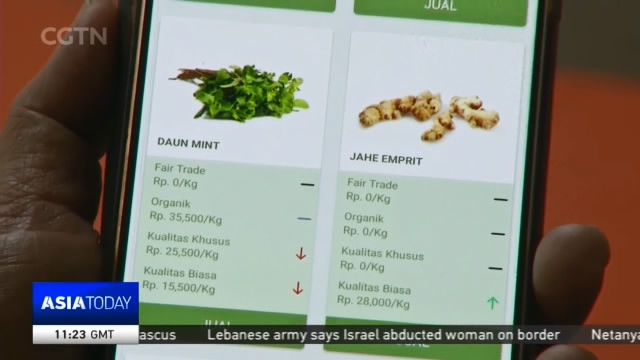
19:54, 29-Apr-2018
Indonesia Modern Agriculture: Digital farming boom helps farmers' livelihood
02:34

As Indonesia's digital economy continues to boom, it is now transforming the country's agriculture, helping farmers sell their harvest directly to customers. But as CGTN's Silkina Ahluwalia reports, farmers in areas with little to no internet connection are missing out.
Indonesia is home to millions of hectares of fertile soil. The agriculture sector is considered one of the most important contributors to the country's economy, employing more than 50 million individuals.
RegoPantes is working to change the lives of independent farmers working to make a decent living in Indonesia.
The price of farmers' harvest is usually sold below cost, as many of them rely heavily on middlemen who help to sell their produce at various markets.
But that is now in the past. Today, with the help of their app, farmers have more power and all with the tap of a finger.
WIM PRIHANTO CO-FOUNDER, REGOPANTES "Our vision is simple. We created the app to break the chain from farmers to consumers. For commodities that are popular, farmers usually have to go through 8 to 13 middlemen, and along the way, the price decreases and income reduces for them. With this app, farmers can immediately post their produce and sell it to consumers."
The app has also helped farmers to understand the market a little better. They are able to learn how it works and what they can do to get better prices for their hard work.
SILKINA AHLUWALIA JAKARTA, INDONESIA "Many e-commerce websites in Indonesia are also enabling farmers to sell their produce directly to customers and not just around their community, but across provinces in the country. Although they're only able to sell in small volumes, for now, the price remains affordable and increasingly competitive."
Through the e-commerce platforms, hundreds of farmers in Central and East Java, for example, can directly accommodate to their customers in Jakarta.
DWI ANDREAS SANTOSA AGRICULTURAL EXPERT "Smart Agriculture has a lot of potential in Indonesia but there are also challenges. Less than 5 percent of farmers in the country are under 35 years old, which means many of them still do not own a smartphone. Aside from that, in smaller areas, with the poor infrastructure, there is no internet so it is difficult to be a part of digital farming."
Dwi says those challenges can be overcome and Smart Agriculture is already beginning to enhance the productivity of agricultural companies and smallholder farmers. Silkina Ahluwalia, CGTN, Jakarta.

SITEMAP
Copyright © 2018 CGTN. Beijing ICP prepared NO.16065310-3
Copyright © 2018 CGTN. Beijing ICP prepared NO.16065310-3